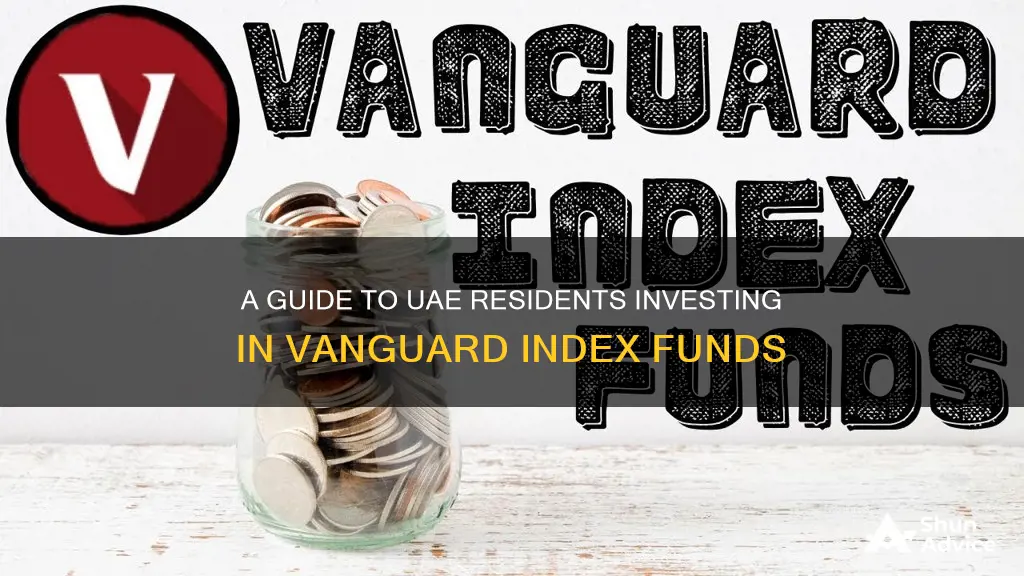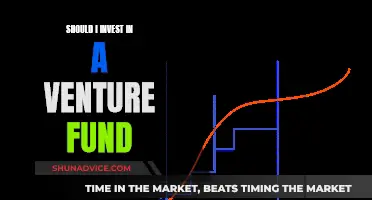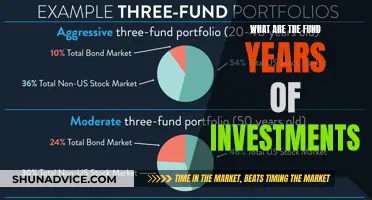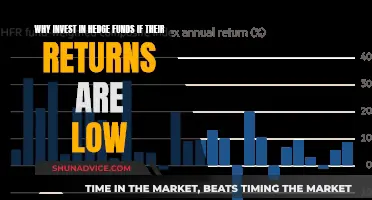
Investing in Vanguard index funds from the UAE is a popular choice for those seeking exposure to the US market and its potential long-term growth. Vanguard, alongside iShares, offers reliable and cheap index funds. To get started, investors need to open a brokerage account with a specialised firm or a mutual fund company, such as eToro, Baraka or Wealthface. When choosing a platform, it is important to consider factors such as fees, minimum deposit requirements and the range of ETFs available.
Once the account is open, investors can purchase Vanguard index funds, such as the Vanguard S&P 500 ETF, which tracks the performance of 500 large US companies. It is important to analyse the past performance of the fund and its expense ratio before investing.
Index funds are a great way to diversify your portfolio and reduce risk, as they are passively managed and track the performance of a specific market index. They are also more tax-efficient and have lower fees compared to other investment vehicles.
| Characteristics | Values |
|---|---|
| Index funds track | Value or performance of a group of bonds or stocks |
| Index funds represent | A specific sector or geographical market |
| Operated by | Index fund managers |
| How to invest | Pick an index, choose the right fund, and buy index fund shares |
| First step | Determine the sector, market, or companies to invest in |
| Example indices | S&P 500, FTSE 100, Dow Jones Industrial Average |
| Second step | Choose the right index fund |
| Third step | Buy into the index fund |
| Popular index funds for UAE investors | Vanguard S&P 500 ETF, NASDAQ Dubai, Global X MSCI Next Emerging & Frontier ETF, iShares MSCI UAE ETF |
| Advantages of index funds | Easy to understand, lower fees, more tax-efficient, lower risk exposure, decent returns |
| Disadvantages of index funds | Never beat the market performance, no stop-loss protection, basket of different stocks |
| Ways to get started with index funds in UAE | Open an account with a UAE broker or via a financial advisor |
| Recommended brokers | eToro, AvaTrade, Saxo Bank |
What You'll Learn

Choosing the right index fund
Once you have decided on an index to invest in, such as the Dow Jones Industrial Average, you will need to find out which index fund tracks its performance most accurately. If multiple index funds are available for your chosen index, you will need to determine which fund tracks the performance of the index most closely and which has the lowest costs.
There are a few key considerations to make when choosing the right index fund:
- Cost: Index funds and ETFs typically charge an annual fee called an expense ratio, which covers the operating expenses for a fund. Even though index funds simply aim to emulate the performance and composition of existing indexes, there are still costs associated with buying and selling the investments they hold. When deciding between funds, opt for the fund with the lowest expense ratio, as this will work out better for you than similar funds charging higher fees over time.
- Restrictions and limitations: Find out if the index fund has any limitations or investing restrictions. For example, many mutual funds have minimum investment requirements.
- Other index funds: Determine whether the fund provider has other interesting index funds that you may also be interested in using.
- Brokerage options: You can open a brokerage account that allows you to buy and sell shares of the index fund that interests you. Some brokers charge extra for their customers to buy index fund shares, so it may be cheaper to go directly through the index fund company to open a fund account. However, if you plan to invest in several index funds offered by various fund managers, the brokerage option could be the best way to combine all your investments under a single account.
Some of the best-performing index funds for UAE investors include:
- The Vanguard S&P 500 ETF: Tracks the performance of the 500 largest US-based companies.
- The NASDAQ Dubai: Tracks the performance of the largest technology companies in the UAE.
- The Global X MSCI Next Emerging & Frontier ETF: Tracks the performance of high-growth emerging markets and excludes slower-growing emerging markets like Brazil, Russia, India, China, and Taiwan.
- The iShares MSCI UAE ETF: Tracks the results of large and mid-cap UAE equities.
Additional Considerations
When investing in index funds, it is important to be careful about the fund and category you pick. Here are some additional factors to consider:
- Tracking error and expense ratio: Compare the tracking error and expense ratio before selecting a fund.
- Broad index vs select stocks: If you are looking at index investing, it is better to go with a broader index than to select a few stocks in any segment. Therefore, avoid indices like Small Cap 50 and Mid Cap 50.
- Risk and return: Compare the average return and volatility of different indices. For example, the Nifty Midcap 150 index has a higher average return over five years than the small-cap index and is less volatile in different market conditions.
- Passive vs active funds: Passive funds mirror an index by investing in the same stocks as the index they are tracking and in the same proportion. Passive funds are generally of two kinds: index funds and exchange-traded funds (ETFs). For investing in ETFs, you need a demat account as they can be bought and sold on the stock exchange, just like stocks. On the other hand, in index funds, you can buy the units from the fund house like any other mutual fund.
Final Thoughts
By following these guidelines and making informed investment decisions that align with your financial goals, you can successfully choose the right index fund for your investment journey.
A Guide to Investing in BDO Equity Funds
You may want to see also

Buying into the index fund
Once you have decided on an index to invest in, such as the Dow Jones Industrial Average, you will need to find an index fund that tracks its performance accurately. If there are multiple index funds available for your chosen index, you will need to find the one that tracks the performance of the index most closely and has the lowest costs. It is also important to find out if the fund has any limitations or investment restrictions.
After you have found the right fund, you can open a brokerage account that offers this index fund. Alternatively, you can invest in a mutual fund that provides access to the fund. It is recommended to compare the costs and features of different brokers before signing up with a particular one. Although you can sometimes invest directly through the index fund company, having all your investments in one place with a broker can give you a better overview and a central place from which to arrange everything.
Some of the best-performing index funds for UAE investors include:
- The Vanguard S&P 500 ETF, which tracks the performance of the 500 largest US-based companies.
- The NASDAQ Dubai, which tracks the performance of the largest technology companies in the UAE.
- The Global X MSCI Next Emerging & Frontier ETF, which tracks the performance of high-growth emerging markets, excluding slower-growing markets like Brazil, Russia, India, China, and Taiwan.
- The iShares MSCI UAE ETF index fund, which tracks the results of large and mid-cap UAE equities.
Index funds are a great way to diversify your portfolio, lower your risk and trading fees, and grow your capital over the long term.
Investment Firm Fund Closures: Strategies Behind the Scenes
You may want to see also

Understanding the pros and cons of index funds
Index funds are an excellent way to diversify your portfolio, lower fees, and generate decent returns. They are financial instruments that track the value or performance of a group of bonds or stocks, representing a specific sector or geographical market. Here are some pros and cons to help you understand the benefits and drawbacks of investing in index funds, specifically in the UAE context.
Pros of Index Funds:
- Easy to Understand and Invest: Index funds are straightforward because you know exactly what you're investing in and what returns to expect by looking at the target index.
- Lower Fees: Index funds are cheaper to manage than mutual funds due to their passive nature, resulting in lower expense ratios.
- Tax Efficiency: Less frequent buying and selling of index funds by fund managers can lead to tax savings on capital gains.
- Lower Risk Exposure: Index funds track multiple stocks and are less volatile, reducing overall risk compared to individual stocks.
- Decent Returns: Index funds like the S&P 500 have consistently delivered around 10% annual returns.
Cons of Index Funds:
- Market Performance Limitation: Index funds only match market performance and don't aim to outperform it. When the market declines, your investment value decreases without any loss protection.
- Lack of Stop Loss Protection: Index funds represent an entire market or sector. If that sector underperforms, your investment value decreases accordingly.
- Limited Customization: You are investing in a basket of stocks, some of which you may not want in your portfolio.
Unlocking Pension Funds: Impact Investing with Fitzpatrick and Omidyar
You may want to see also

Comparing Vanguard to other investment options
Vanguard is a well-known investment firm that offers a range of low-cost funds and ETFs, making it particularly appealing for long-term investors. When comparing Vanguard to other investment options, there are several factors to consider, including performance, fees, investment strategy, and diversification.
Performance
Vanguard has a strong track record of market-beating returns, with some of its funds consistently outperforming their peers. For example, the Vanguard Total Stock Market Index Fund Admiral Shares (VTSAX) tracks the CRSP US Total Market Index and has achieved a low turnover rate of 2.2% and a competitive expense ratio of 0.04%.
Fees
Vanguard is known for its low-cost investment options, which can be attractive for investors looking to minimize fees. The expense ratios for Vanguard funds and ETFs are generally low, and in some cases, they are lower than those of corresponding mutual funds. However, when purchasing or selling Vanguard ETFs, investors may incur transaction costs that would not apply to no-load mutual funds.
Investment Strategy
Vanguard offers a variety of funds and ETFs that cater to different investment strategies. For example, the Vanguard 500 Index Fund Admiral Shares (VFIAX) is commonly used as a tax-loss harvesting partner, while the Vanguard Value Index Fund Admiral Shares (VVIAX) targets the "value" factor, allowing investors to potentially outperform the market.
Diversification
Vanguard provides a wide range of investment options that allow for diversification across different asset classes, sectors, and geographies. For instance, the Vanguard Total International Stock Index Fund Admiral Shares (VTIAX) offers exposure to international stocks, while the Vanguard Total World Stock Index Fund Admiral Shares (VTWAX) provides a globally diversified portfolio.
When comparing Vanguard to other investment options, it is important to consider the level of diversification offered. Some alternative investment options may provide access to similar or even broader ranges of investments, depending on the specific product and platform.
Other Investment Options
There are several other investment options available to residents of the UAE, including mutual funds, index funds, and exchange-traded funds (ETFs).
Mutual Funds
Mutual funds are a type of investment fund that pools money from multiple investors to purchase a diversified range of assets, such as stocks, bonds, or other securities. Mutual funds are actively managed by fund managers, who make investment decisions on behalf of the fund's investors. While mutual funds offer professional management and diversification, they typically have higher fees compared to other investment options.
Index Funds
Index funds are passive investment funds that aim to replicate the performance of a specific market index, such as the S&P 500 or the FTSE 100. Index funds have lower fees than actively managed funds because they do not require active management or rebalancing. They are also considered less risky since they track the performance of multiple stocks and are not prone to significant fluctuations. However, index funds will never outperform the market because they only track market performance.
Exchange-Traded Funds (ETFs)
ETFs are similar to mutual funds in that they provide exposure to a diversified portfolio of assets. However, ETFs are traded on stock exchanges, and their prices fluctuate throughout the day based on market demand. ETFs typically have lower fees than mutual funds, and they offer more liquidity since they can be bought and sold during market hours.
When comparing Vanguard to other investment options, it is worth considering the specific features and benefits of each investment product and how they align with your investment goals, risk tolerance, and time horizon. It is always recommended to conduct thorough research and, if necessary, consult with a financial advisor to determine the most suitable investment options for your individual circumstances.
A Beginner's Guide to Mutual Fund Investing with Fidelity 401(k)
You may want to see also

Finding a suitable broker
- Reputation and Regulation: Look for brokers that are well-established and have a good reputation in the industry. Ensure they are regulated by reputable financial authorities to protect your investment.
- Account Requirements: Different brokers have varying requirements for opening an account. Some may require a minimum initial investment or a minimum balance, while others may offer accounts with no minimum requirements. Choose a broker that aligns with your financial capabilities.
- Transaction Fees and Costs: Brokers charge various fees for their services, such as transaction fees, annual platform fees, or management fees. Compare the cost structures of different brokers to find one that suits your budget and investment strategy.
- Investment Options: Not all brokers offer access to the same investment options. Ensure that the broker you choose provides access to Vanguard index funds and other investment vehicles that align with your goals.
- Customer Service: The quality of customer service can vary among brokers. Look for a broker that offers prompt and responsive support through multiple channels, such as phone, email, and live chat.
- Tools and Resources: Some brokers provide additional tools and resources to support your investment decisions, such as research materials, market data, and analysis tools. These can be valuable in making informed choices.
- User-Friendly Interface: Opt for a broker with a user-friendly platform that is easy to navigate and use. This is especially important if you are new to investing.
- Security and Safety: Ensure that the broker prioritises the safety of your personal and financial information. Look for brokers that employ robust security measures and protocols to protect your data and investments.
- International Access: If you plan to invest internationally, choose a broker that facilitates global investments. Some brokers may have restrictions on investing in specific countries or regions.
- Reviews and Testimonials: Consider the experiences of other investors by reading reviews and testimonials about the brokers you are considering. This can provide valuable insights into the quality of their services, reliability, and overall customer satisfaction.
- EToro: A well-known multi-asset platform that offers a wide range of investment options, including stocks, cryptocurrencies, and CFDs. eToro provides portfolio management services and has an innovative social trading feature called CopyTrading.
- Baraka: A user-friendly platform with no minimum investment requirements, offering access to over 6,000 US-listed securities. Baraka provides comprehensive market data, insights, and educational content to guide investors.
- Wealthface: A UAE-based online platform that facilitates brokerage accounts for trading in the US stock market. Wealthface prioritises security and provides educational resources, making it ideal for beginners.
- Saxo Bank: A reputable broker that offers access to various markets, including Vanguard index funds. They provide low-cost investment options and are regulated in multiple jurisdictions.
- Interactive Brokers: A US-based broker with a wide range of investment options, including Vanguard index funds. They have a minimum investment requirement and charge transaction and platform fees.
Remember to conduct thorough research, compare multiple brokers, and consider your specific needs and investment goals before making a decision.
Hedge Fund Insights: EDGAR Investment Info Source
You may want to see also
Frequently asked questions
Index funds are a great way to diversify your portfolio and reduce risk. They are easy to understand, have lower fees and generate decent returns.
First, determine the sector, market or companies you want to invest in. Then, find an index fund that tracks its performance accurately. Compare the costs and features of different brokers before signing up.
You can use an international brokerage account offered by companies like eToro to invest in Vanguard's S&P 500 ETF (VOO) from the UAE.
The main risk is that index funds will never outperform the market as they only track market performance. They also lack stop-loss protection, so if the market goes down, your investment loses value.







